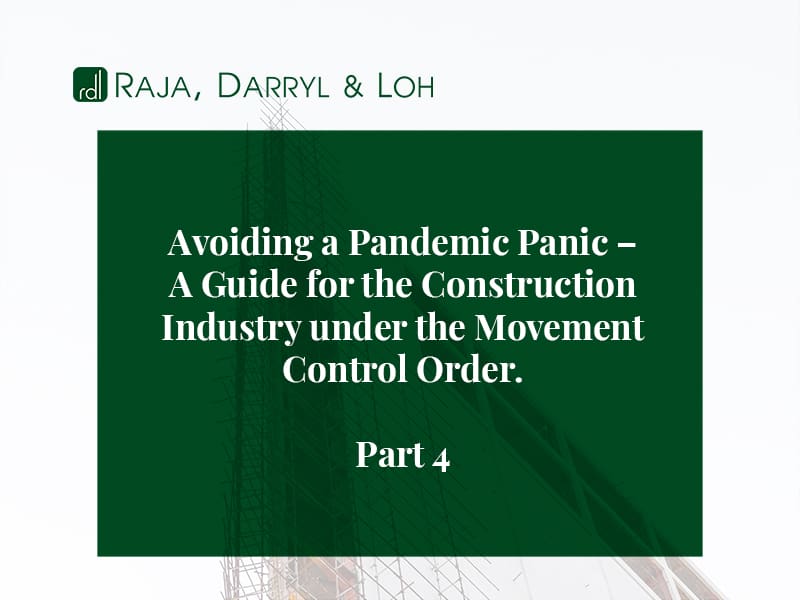Part Four – The Movement Control Order – What to do next?
While the contractor is likely to have no choice (unless the works fall within “essential services” or the contractor or owner obtains an exemption) but to stop work, there are many things which both the owner and contractor should take cognisance of. These include:
- Is there an applicable force majeure clause in the contract?
- Is the force majeure clause wide enough to cover the present pandemic or MCO, either by specific mention (words such as “outbreak of disease, epidemic, or pandemic” are common) or by the presence of a catch-all term (for example, “any other occurrence of a similar nature” or “any other event which could not have been reasonably foreseen by either party before entering into this contract”)?
- Are there are other clauses which are relevant, such as clauses on suspension, change of law, compliance with law which may give rise to an entitlement to extension of time and/or cost and expense?
- If there are contractual remedies, what are the steps that must be taken?
- How can the procedural requirements, timing requirements and evidential requirements be satisfied?
- If the procedural requirements, timing requirements and evidential requirements are not satisfied or cannot be satisfied, what can be done to remedy that?
- What prudent steps or best practices can be followed so that all relevant parties are aware that firstly, certain requirements were not satisfied or cannot be satisfied, and secondly, steps are being taken to remedy that?
- How is the contractor going to discharge his duty to mitigate the effects of the pandemic and MCO? How far and for how long does that duty extend?
- In the meantime, there is still the duty to maintain the site and to ensure the safety and security of the site while works are stopped – has the contractor taken enough steps to satisfy this duty?
- While the MCO and pandemic will not last perpetually, is there a time at which the contract may be considered as frustrated or terminable under the terms of the contract?
- There should be plans in place for post-MCO resumption – once the MCO ceases, the expectation is that progress of the works will be back to normal in no time;
- What is the evidence, especially documentary evidence and site condition evidence, that needs to be collated and preserved?
- Does insurance provide cover for the MCO or the pandemic? What steps must be taken to preserve or mount an insurance claim?
- Even when the MCO comes to an end, will the pandemic still be a force majeure event affecting the works under the contract, and to what extent?
The physical work at site may have stopped, but the preparation work both for the resumption of work and for pursuing/defending a claim has not (or should not stop). It is foreseen that due to the nature of the MCO and pandemic, which is not a common occurrence in Malaysia (in fact, it probably has never occurred before, or at least not on this scale), the issues arising therefrom will be substantial and heavily disputed. It may rewrite the rules that we are all accustomed to as we are moving into unchartered waters. The better prepared you are, the better chance you have of staying afloat!
Contributed by:
Joshua Chong (Partner)
(E): joshuachong@rdl.com.my
(D): 03-26329876
Chen Huan Yung (Associate)
(E): hychen@rdl.com.my
(D): 03-26329947
